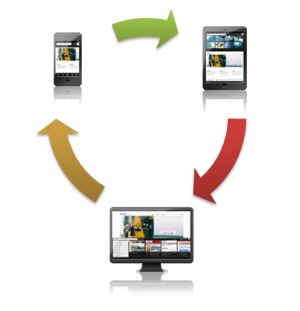A Look At Cross-Device Search & Conversion
Mobile and Tablet strategy was a heavily discussed topic at SMX Seattle earlier this month. While there were no major revolutionary insights; I did feel that the many of the experts had important general consensuses regarding the non-PC space. Mobile search is exploding in volume and shows no signs of slowing down. As search marketers, […]
Mobile and Tablet strategy was a heavily discussed topic at SMX Seattle earlier this month. While there were no major revolutionary insights; I did feel that the many of the experts had important general consensuses regarding the non-PC space. Mobile search is exploding in volume and shows no signs of slowing down. As search marketers, we have no choice but to create online strategies that addresses both the strengths and limitations of Mobile advertising.
Two Main Takeaways
• It is best practice to break out your PPC program by device (mobile, tablet, desktop) allowing for higher resolution optimizations in the keyword list, ad copy, landing pages, targeting, and bidding strategy.
• Cross-device tracking is still something which cannot be done due to the current cookie-based tracking limitations There is no simple way to identify the same user across multiple devices, and it is currently impossible to analyze cross-device interactions.
Hence the question: what is a good cross-device paid search strategy? Are there any workarounds to the current tracking limitations?
How To Define Success?
It is always a challenge to step away from the core idea that investment should be a reflection of direct performance. Non-PC devices offer many avenues of engagement but ultimately do not drive revenue as well as their desktop/laptop counterparts.
This is due to multiple independent variables… small screens make it difficult to view products, small keyboards create a challenge in entering the long number strings of credit card information, and many websites are not mobile-optimized creating a poor user experience.
That being said, mobile devices play an important role within the buying cycles as general information while you’re on the go.
Examples Of Common Mobile Behavior
- Look up for shopping information about an item to purchase online
- Find address and store hours
- Look at consumer reviews of product during the purchase process
- Look for retailer or product coupons
- Check price of product while in store to determine ‘good deal’
Long story short, mobile devices touch the buying cycle often and in a variety of ways that will not have proper conversion attribution, so it is worth expanding the traditional conversion to encompass a wider definition, or more specifically a “pre-conversion”.
Pre-conversions can take several forms such as:
- Call
- App download
- Watching a video
Basically anything that reflects engagement is relevant to the mobile experience, and can be monetized after correlating the life-time value. By that, I mean that you might be able to understand the relationship between those “pre-conversions” early in the beginning of the conversion process, and the final conversion.
For example, say you’re able to estimate that 10% of all users who download your app eventually convert on your site – then you can actually come up with a cost per app download which makes sense to your end revenue numbers.
However, it is still unclear what the percentage of conversions occurring on desktops actually originated from mobile searches. How can one measure the impact of a mobile paid search campaign on the end revenue?
Cross-device Tracking & Strategy
Unfortunately there is still no simple way to track users across devices; however, the information is being collected out there:
• Site login/user recognition allows advertisers to connect user behavior across devices. You might want to add some kind ‘Device’ parameter in your URLs to get to know whether users are using a mobile device, a tablet, or a desktop. Then you should be able to connect the dots.
• Google is definitely collecting traffic and revenue numbers across devices for those users logged in to their Google account across multiple devices.
• Yahoo! Recently released Yahoo! Axis on desktop/tablets/smartphones so web users can continue their web experience from a device to another.
• Facebook is also collecting cross-device statistics.
• While one can reasonably expect Google/Yahoo/Facebook to release a couple of white papers about the benefits of mobile marketing campaigns in the near future, you can also check out third-party solutions such as Adbass or Convertro are developing cross-device/browser tracking – might be worth a look.
If you want to test mobile’s impact on your account it is always possible to run a test yourself. A simple, old-school way of running this test is to turn off all your mobile campaigns for one complete buying cycle, and then reactivating your mobile effort to quantify with/without residual.
Some of my clients at eSearchVision are currently implementing such test environments to quantify the impact of mobile traffic on desktop campaigns – I’m looking forward to the results and would be glad to share them.
Conclusion
Cross-device advertising is the next frontier for online marketers. While the technology is being developed and shared across the industry, online marketers need to start thinking about how to quantify and test mobile’s importance.
Traditional CPA/ROAS metrics do not tell the full story, there are “pre-conversion” indicators out there which are relevant to the mobile experience and can be monetized considering consumer life-time value.
Opinions expressed in this article are those of the guest author and not necessarily Search Engine Land. Staff authors are listed here.
Related stories
